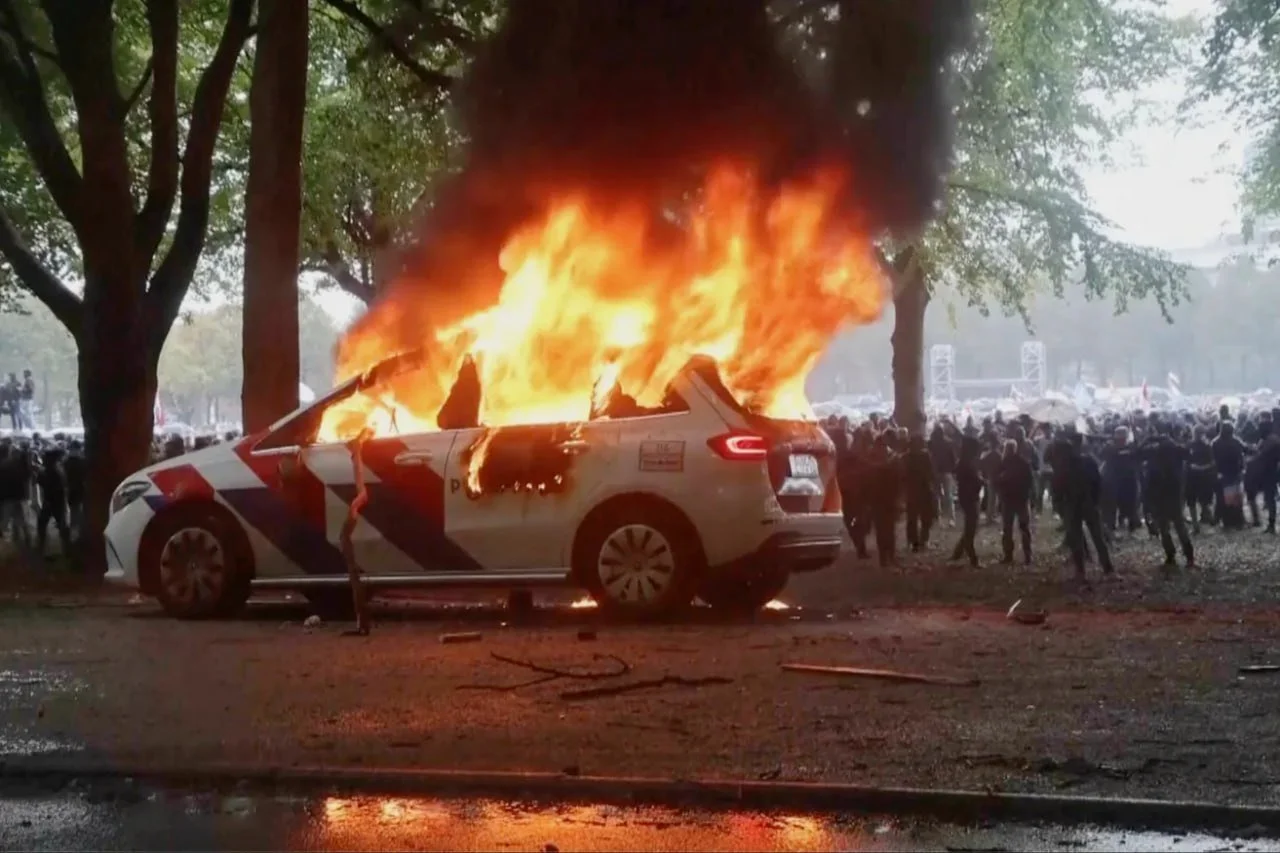Far-Right Protest in The Hague Turns Violent as Football Hooligans Join Riots
Executive Summary
An anti-immigration protest in The Hague erupted into violent riots involving far-right groups and organized football hooligans, resulting in dozens of arrests, injuries to police officers, and the vandalism of political party offices. The events underscore the convergence of extremist politics with hooligan networks, raising the risk of escalating political violence in the Netherlands ahead of national elections.
Key Judgments
1. The Hague riots demonstrate the fusion of far-right extremism with organized football hooliganism into a coordinated street protest ecosystem.
Evidence: Researchers observed groups of hooligans from multiple cities who used “hit and run” tactics typical of football violence, alongside demonstrators carrying nationalist flags and banners. Nazi salutes and slogans such as “send them home” highlighted the ideological alignment.
2. Attacks on political infrastructure, particularly against the Democrats 66 (D66) party headquarters, show an escalation from symbolic protest to targeted political intimidation.
Evidence: Rioters smashed the windows of D66 offices, causing significant damage. The party is seen by far-right groups as representative of liberal elites and pro-immigration policies, making it a symbolic target.
3. Political leaders condemned the violence but quickly reframed it along partisan lines, reflecting deep polarization ahead of elections.
Evidence: D66 leader Rob Jetten described the violence as an assault on democracy, while Party for Freedom (PVV) leader Geert Wilders condemned rioters as “scum” but accused the left of selective outrage. Finance Minister Eelco Heinen downplayed the political angle, framing the unrest as hooliganism.
4. The riots occurred amid a heightened security climate in The Hague following recent attacks against the Israeli embassy, illustrating the city’s growing role as a flashpoint for extremist activity.
Evidence: Just one day before the riots, a suspect attempted to set fire to the Israeli embassy lobby—the second incident in weeks. Authorities have warned of increased threats against Israeli and Jewish institutions in Europe tied to Iran and Hamas.
Analysis
The violence in The Hague marks a significant escalation in the Netherlands’ ongoing struggle with political extremism and social unrest. What began as an anti-immigration protest quickly devolved into organized street violence, combining the networks of far-right activists with the tactical discipline of football hooligans. This convergence creates a potent and adaptable threat, capable of mobilizing quickly and amplifying violence at political demonstrations.
The ideological dimension of the riots was unmistakable. Chants of “we are the Netherlands,” Nazi salutes, and calls for “remigration” reflect a mainstreaming of extremist rhetoric. The deliberate targeting of Democrats 66 (D66), a centrist-liberal party strongly identified with pro-immigration policies, indicates that political intimidation is becoming an accepted tactic for some far-right factions. By damaging party headquarters, rioters sought not only to disrupt but to send a warning about the costs of opposing their agenda.
Political reactions to the riots revealed the extent of polarization in Dutch politics. Progressive leaders cast the violence as a symptom of rising far-right populism, while conservative figures downplayed ideological motivations and emphasized the role of hooligans. Geert Wilders, a central figure in the anti-immigration movement, walked a fine line: he condemned the violence but sought to shift blame toward political opponents, careful not to alienate potential sympathizers within the protest ecosystem.
These events also unfolded in a broader climate of insecurity in The Hague, where attacks on the Israeli embassy have highlighted vulnerabilities to politically and ideologically motivated violence. The embassy incident, along with pro-Palestinian vandalism in Europe, underscores how international conflicts intersect with domestic unrest, reinforcing the city’s role as a symbolic battleground.
With elections scheduled for late October, the riots raise the stakes for Dutch security services and political leaders. The combination of political extremism, hooliganism, and international tensions has created a volatile environment where protests can rapidly evolve into targeted violence against political institutions and foreign diplomatic sites.
Sources
Jurist – At least 30 arrested after anti-immigration protest in the Netherlands turns violent
Reuters – Dutch police use water cannon against anti-immigration protesters
Jerusalem Post – Suspect arrested for burglary, arson attempt at Israeli embassy in The Hague
Ynet News – Suspect arrested after attempted arson at Israeli Embassy in The Hague
Dutch News – Riots in The Hague blended far right with football hooliganism


